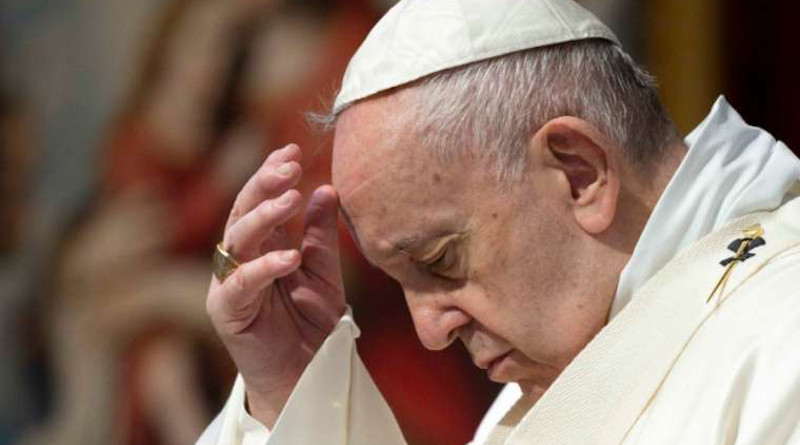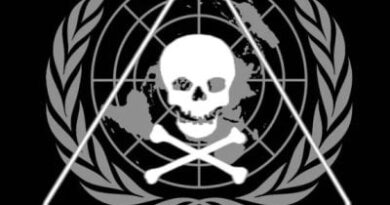Fratelli Tutti And The Great Reset – OpEd

Pope Francis on 3 Oct 2020 released at a ceremony at the tomb of St. Francis in Assisi his latest encyclical letter, Fratelli Tutti.
Less than four months previously, Klaus Schwab and his co-author Thierry Malleret launched Covid-19: The Great Reset at Davos, under the auspices of the World Economic Forum (WEF).
In some ways their authors might appear to share a common worldview. Schwab´s 2020 Manifesto, The Universal Purpose of a Company, is studded with phrases borrowed from the social doctrine of the church. Regarding Covid, The Great Reset writes that the storm will accelerate disturbing trends that have been building up for a long time. Somewhat similarly, Pope Francis writes that the storm of the pandemic has only made it more urgent that we rethink our styles of life, our relationships, the organization of our societies, and the meaning of our existence.
In the World of Pope Francis,
“The storm has exposed our vulnerability and uncovered those false and superfluous certainties around which we constructed our daily schedules, our projects, our habits and priorities… Amid this storm the façade of those stereotypes with which we camouflaged our egos, always worrying about appearances, has fallen away, revealing once more the ineluctable and blessed awareness that we are part of one another, that we are brothers and sisters of one another.”
In the fury of the storm we come to realize not just with our brains but with our whole beings that our true selves are not wholes but parts. We are kin in living networks for which over the ages no better words have been found than “sister”, “brother” and “family”. Saint Francis in his Canticle of the Sun sang of brother sun and sister moon, brother fire and sister water.
“Storms” can be and often are moments of truth; they can be times when we see who we are and who we want to become. Storms can transform our souls and commit us to service. The present pandemic offers many examples.
Other popes have also provided articulate leadership when society has faced existential physical challenges. Consider Pope Gregory the First. Gregory formulated the seven deadly sins still recognized by the Catholic Church and by several protestant denominations.
When Gregory became Pope, the city of Rome had changed rulers repeatedly since 376 when hordes of ungovernable tribal peoples first entered the Empire. Many were dying from recurrent plagues; indeed, Gregory became Pope in 590 when his predecessor, Pelagius II died of the plague. Rome had nominally been reconquered by the Roman Empire, but the seat of the Empire had been moved to Byzantium. The byzantine Emperor Theodosius, occupied by threats closer to home, was unwilling to send troops to reinforce the garrison at Rome.
The new Pope found Rome filled with homeless and hungry refugees fleeing from wars farther north. His immediate and constant preoccupation was to be sure they were welcomed and fed. It was said that he would not eat himself everyone else in what was left of Rome had had their meal. To guarantee the food supply, Gregory organized agricultural production on lands ceded to the church.
As a thought exercise, without underestimating the importance of virtues and joys, I suggest thinking of Pope Gregory´s list of seven deadly sins as a creative adaptation of human culture to its physical, emotional, and spiritual functions. I will write just a very few words regarding each sin, leaving it to the reader to add to them or subtract from them.
- Pride: More humility, less violence
- Greed: Create surplus for the purpose of sharing it (Acts 20:30-35)
- Wrath: Less wrath, less violence, less fear
- Envy: Less envy, less violence, more joy
- Lust: Less lust, less fear, fewer mouths to feed
- Gluttony: Consume only as much as you need, so there will be enough to go around
- Sloth: Work is a call to service
Let me compare the similar Worlds of Francis and Gregory to those of Klaus Schwab and Thierry Malleret. I read the latter as striving to transcend orthodox economics, but not yet succeeding.
Covid 19: The Great Reset is first described by its authors as
“an attempt to identify and shed light on the changes that are ahead, and to make a modest contribution in terms of delineating what their more desirable and sustainable forms might resemble.”
There follow grand claims that appear to be inconsistent with the modest aims just stated:
“… the possibilities for change and the resulting new order are now unlimited and only bound by our imagination. You get the point: we should take advantage of this unprecedented opportunity to reimagine our world, in a bid to make it a better and more resilient one, as it emerges on the other side of this crisis.”
What would that better world be like? The authors state a first premise on page 78:
“First and foremost, the post-pandemic era will usher in a period of massive wealth redistribution, from the rich to the poor and from capital to labour.”
Continuing, they suggest that neoliberalism is over. Solidarity is back. Government intervention for the sake of social welfare is back. Now is the time to enact sustainable environmental policies.
While making dazzling points like “our” opportunity to create a better world has arrived, the WEF authors invariably revert to a cautious “on the other hand.” For example, they say a focus on the environment might gain traction during the pandemic, but on the other hand, when the pandemic fades the focus on the environment might fade too, because:
- “Governments could decide that it is in the collective best interest to pursue growth ´at any cost´ in order to cushion the impact on employment.
- “Companies will be under such pressure to increase revenue that sustainability in general and climate considerations in particular will become secondary.
- “Low oil prices (if sustained, which is likely) could encourage both consumers and business owners to rely even more on carbon-intensive energy.”
Let me suggest that this list 1 to 3 of reasons why formal commitments to saving the environment made during a crisis are likely to be unreliable is one of many passages revealing that it is typical of the WEF to proclaim fraternité and then to default to the mental models of orthodox economics. As Keynes famously wrote,
“The difficulty lies, not in the new ideas, but in escaping from the old ones, which ramify, for those brought up as most of us have been, into every corner of our minds.”
Economic mental models remain normal for millions of people even when they know that their World is unsustainable because it is incompatible with physical reality.
Fratelli Tutti is a message from a Catholic Christian addressed to believers, convinced atheists, nonbelievers, and people to whom the word “God” means nothing at all. It must be so. Today`s barque of Saint Peter can only contribute to global transformation by reaching out to everyone else, sharing insights, and collaborating.
I must be right when I argue that an unsustainable option, like sacrificing ecology to please shareholders in the short run, is not an option at all. It can only be a temporary illusion. But I need to strengthen my argument for saying that Francis and Schwab think in different Worlds.
To that end, let us consider what follows the passage from The Great Reset just quoted. The text proceeds “on the other hand” to give four reasons why, after all, a post-pandemic ecological disaster might not happen. They are:
- Enlightened leadership
- Greater risk awareness
- More ecologically conscious behaviour
- Activism
A first way to interpret why the authors say ecocide might not happen would say that workers might accept unemployment, shareholders might accept lower or no profits, buyers might pay more for energy, and everybody might accept the market economy slowing down or stopping, if 1 -4 persuaded them to give first priority to saving the biosphere.
A second, more plausible, interpretation is that because 1 – 4 will generate enormous motivation to solve the problems illustrated by 1 -3 above; because they will make the millions of Prince Charleses, Greta Thunbergs, and Al Gores already passionately committed to building a green world even more numerous and even more passionate, then even though the authors of The Great Reset propose no viable path to making harmony with nature compatible with dignified employment for all and the creation of wealth for society, somebody will.
It is significant that as the market economy has slowed, because of the pandemic, we have seen remarkable improvements in air quality, reversal of global warming, death rates exceeding birth rates, and encouraging numbers for other measures of ecological sustainability. We have seen remarkable human solidarity with volunteers staffing food banks and frontline caregivers risking their lives to save others. We see books, like the two here considered, rethinking the fundamental premises of the global economy now dominant.
Francis and Schwab agree that the World is broken. How can we fix it? “First and foremost,” says the book from the WEF, by a mass redistribution of property, from the rich to the poor, from capital to labour. It is as if the winners of the economic game, the owners of the World, had come to realize that by winning they have lost. They have created a world that cannot sustain them or anyone else.
But as The Great Reset proceeds, it becomes clear that the authors do not argue that anything they say is necessarily right or true. They throw out for discussion massive wealth distribution and many other tentative ideas for “resetting” the modern world-system –for economic, financial, societal, geopolitical, environmental, technological, industrial, individual, moral, and mental health resets, among others. The WEF authors do not articulate a key idea that identifies a root cause of today´s multiple problems and prescribes a method for solving them.
Pope Francis does. The key idea is “culture of encounter.” While firmly grounded in the theology of an institution older than capitalism, “encounter” strikes chords of contemporary ethics grounded in the writings of many feminists, Martin Buber, Emmanuel Levinas, Jacques Derrida (in his last phase) and many others. In the maelstrom of today`s chaos, the voice of Pope Francis affirms that a culture of encounter brings enduring stability.
“To speak of a culture of encounter means that we, as a people, should be passionate about meeting others, seeking points of contact; building social friendship becomes an aspiration and a style of life.”
(I include with “encounter” a cluster of similar ideas that Pope Francis expresses with similar words: rebirth of a universal aspiration to fraternity, building common horizons that unite us, and the careful and conscientious cultivation of fraternity.)
Fratelli Tutti also considers another question on which The Great Reset (although not some other works by the same authors) is silent: the question what property is.
Concerning private property, Fratelli Tutti is dotted with passages like this one:
“Business abilities, which are a gift from God, should always be clearly directed to the development of others and to the elimination of poverty, especially to the creation of diversified work opportunities. The right to private property is always accompanied by the primary and prior principle of the subordination of all private property to the universal destination of the earth´s goods, and thus the right of all to their use.”
The Pope quotes the Bishops of South Africa:
“True reconciliation is achieved proactively, by forming a new society, a society based on service to others, rather than the desire to dominate; a society based on sharing what one has with others, rather than the selfish scramble by each for as much wealth as possible; a society in which being together as human beings is ultimately more important than any lesser group, whether it be family, nation, race or culture.”
Francis`s line above “especially to the creation of diversified work opportunities” does not only mean, it cannot only mean, hiring more and more people to produce more and more goods for sale. There will never be enough customers, buying at cost-covering prices, to provide dignified employment for all. And if there were, it would be an ecological disaster. Fortunately, there are innumerable other ways to create diversified work opportunities. Public employment, and the small family owned and operated firms that exist to support a household (not to make profits) are two obvious ingredients for a social recipe that will add up to ending poverty. A third major ingredient is the large firm that does make profits. Profits can and should be channeled to the public purse (and from there to employment) and to fund non-profits (and from there to employment).
There are innumerable other ways to create diversified work opportunities, prudently sharing gifts. (1 Corinthians 4:7) The key to ending poverty is to want to. In Gregory`s terms, it is to purify the will of greed and sloth. Pope Francis affirms cultivating authentic relationships with other human beings, growing into cultures of encounter, as a methodology for creating pro-social attitudes. Call it, if you will, a methodology for creating mental health, in a world that is growing every day more insane.
There is, I suggest (while making no claim to originality) a fundamental reason that Schwab and Malleret struggle to reconcile economics with humanity. It is that the bedrock foundation of economics, and consequently its ramifications into every corner of our minds and into every norm of our institutions, is inhumane.
Adam Smith put the matter in colloquial terms when he wrote that to obtain our daily bread, we appeal always to our baker´s self-interest, never to our needs or to his humanity. Recently, André Orléan has spelled out the details in more technical terms, showing that economics rests on the prior existence of a social structure he calls séparation marchande (commercial separation). Where pure markets reign, nobody owes anybody a free lunch. The only way to obtain from another what you need is to excite in someone else a desire to sell it to you. In economics, a need is not effective demand. Money plus willingness to spend the money is.
Hence, although I know there are many good and intelligent people who do not share my view, I concur with E.F. Schumacher that anyone who is serious about reforming economics must reform souls, beginning with his or her own.
*Prof. Howard Richards is a member of the TRANSCEND Network for Peace Development Environment. He is a philosopher of social science who holds the title of Research Professor of Philosophy at Earlham College, Indiana. He was educated at Redlands High School in California, Yale, Stanford, University of California at Santa Barbara, University of Toronto, Harvard and Oxford. His books include The Evaluation of Cultural Action, Letters from Quebec, Understanding the Global Economy, The Dilemmas of Social Democracies, Gandhi and the Future of Economics, Rethinking Thinking, Unbounded Organizing in Community, and The Nurturing of Time Future. He currently teaches in the University of Cape Town`s EMBA programme. His new book, written with the assistance of Gavin Andersson, Economic Theory and Community Development: Why Putting Community First Is Essential for Survival is scheduled to be published in July of 2021.
This article originally appeared on Transcend Media Service (TMS)
*** This article has been archived for your research. The original version from Eurasia Review can be found here ***

